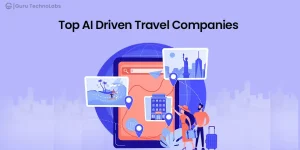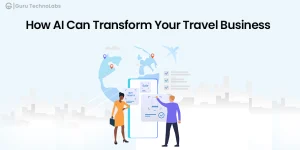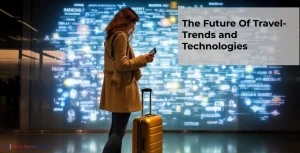AI in Hospitality: Use Cases, Benefits, and Real-World Examples
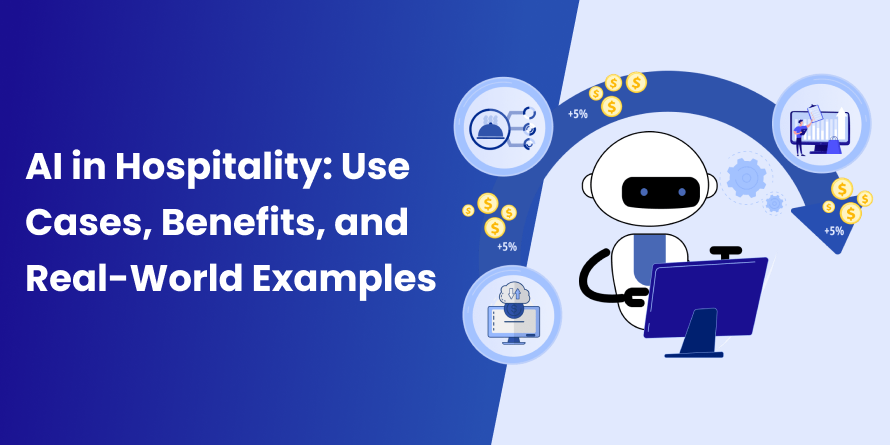
In every era, new wisdom emerges – today, it’s that technology doesn’t just support hospitality, it redefines it. AI in hospitality is no longer a futuristic vision but a daily reality, with hotels and restaurants worldwide embracing digital transformation to meet rising guest expectations. From Marriott’s AI-driven natural language search to Universal Orlando’s facial recognition entry, the shift is already here.
Market forecasts highlight the scale of this transformation: the global AI in hospitality market, valued at just $90 million in 2023, is projected to surpass $1.2 billion by 2026, growing at nearly 9.7% CAGR annually. This surge reflects how hotels are harnessing AI for advanced analytics, automation, and hyper-personalization to stay competitive.
For hoteliers, adopting AI is no longer optional, it’s essential. Guests expect seamless check-ins, tailored experiences, and proactive service, while operators benefit from smarter pricing, predictive maintenance, and more efficient operations.
In this blog, we’ll explore the most impactful AI use cases in hospitality, the benefits they bring, upcoming trends shaping the industry, and real-world examples from leading hotels already embracing the future.
What is AI in Hospitality Industry?
AI in hospitality refers to the use of artificial intelligence technologies such as machine learning, natural language processing, and predictive analytics to enhance hotel operations and guest services. In simple terms, it’s about giving hotels the ability to anticipate guest needs, automate routine tasks, and make data-driven decisions that boost both satisfaction and profitability.
Imagine walking into a hotel where check-in happens via facial recognition, your room adjusts to your preferred temperature, and a chatbot instantly answers your queries. That’s AI in action, seamlessly blending convenience with personalization.
Here are some of the key ways AI is shaping the hospitality industry today:
- Personalized guest experiences
- Automated operations
- Dynamic pricing and revenue management
- Predictive maintenance
- Smart room technology
- Sustainability and efficiency
- Enhanced security
AI also thrives when integrated with supporting systems like travel APIs, which connect hotels to global distribution systems, ensuring real-time data flow that makes these AI-driven experiences possible.
Ultimately, AI in hospitality is not just about technology; it’s about creating smarter, more responsive environments where every guest feels valued and every operation runs with greater efficiency.
Benefits of AI in Hospitality
AI in hospitality is transforming how hotels interact with guests and manage operations. By embedding intelligent technologies, hotels deliver more personalized, efficient, and memorable stays, raising the bar for service across the industry.
1. Personalized Guest Experiences: AI enables hotels to tailor every aspect of a guest’s stay by analyzing large datasets, from room temperature and lighting to dining and activity recommendations. With intelligent data analysis, the AI system ensures each guest feels uniquely valued, boosting satisfaction and loyalty.
2. Instant Support Through Chatbot: Advanced chatbots allow hotels to provide round-the-clock support for guest inquiries and requests. AI-powered chatbots handle everything from booking changes to room service, reducing wait times and freeing up staff for complex tasks.
3. Optimized Revenue Management: AI-driven dynamic pricing and demand forecasting help hotels adjust rates in real-time based on market trends and occupancy. By leveraging AI in the hospitality industry, hotels can make smarter financial decisions without constant manual intervention.
4. Streamlined Operations: AI monitors hotel systems to predict and prevent maintenance issues before they impact guests. This proactive approach minimizes downtime and ensures smooth operations.
5. Enhanced Security and Safety: From facial recognition for keyless entry to automated alerts for unusual activity, AI solutions provide peace of mind. These innovations are often developed by specialized teams, highlighting the value of emerging solutions and expert security services.
20 Use Cases of AI in Hospitality
There is no universal AI for hospitality. Instead, the industry is practicing to implement AI in every part of its modern operations. Here are 20 use cases for AI-powered technology that are rapidly becoming primary for hospitality brands and companies today.
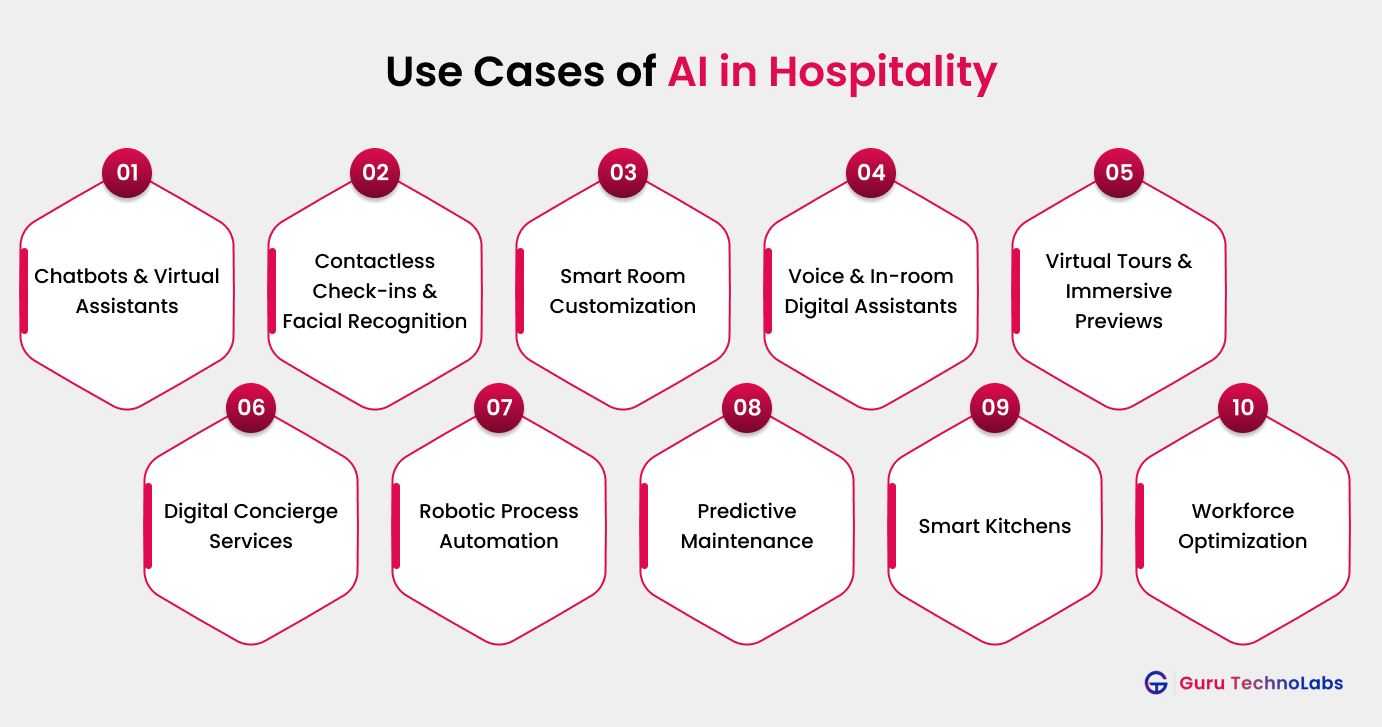
1. Chatbots & Virtual Assistants
AI-powered chatbots handle guest queries instantly, from booking confirmations to local recommendations. Available 24/7 across channels like websites, apps, and messaging platforms, they reduce response time and boost guest satisfaction while lowering operational costs.
2. Contactless Check-ins & Facial Recognition
Facial recognition and digital IDs streamline check-in processes, eliminating queues at the reception. Guests enjoy a frictionless experience, while hotels improve efficiency and reduce reliance on manual front-desk staff.
3. Smart Room Customization
AI enables rooms to automatically adjust temperature, lighting, and entertainment preferences based on guest history. This level of personalization makes stays feel tailor-made and memorable.
4. Voice & In-room Digital Assistants
Guests can control lighting, order room service, or request information via voice-activated assistants like Alexa or Google Assistant. Hotels benefit by reducing staff dependency for routine tasks while offering guests an intuitive, modern experience.
5. Virtual Tours & Immersive Previews
AI-powered AR/VR lets travelers explore hotel rooms, amenities, or event spaces virtually before booking. This builds trust and confidence, driving higher conversion rates for reservations.
6. Digital Concierge Services
Instead of flipping through brochures or calling the front desk, guests can rely on AI-driven concierge travel apps to book restaurants, discover attractions, and get personalized itinerary suggestions in real time.
7. Robotic Process Automation
RPA handles repetitive back-office tasks like billing, data entry, and reporting with accuracy and speed. This frees up human staff for guest-facing roles, ensuring better resource allocation.
8. Predictive Maintenance
AI sensors track the performance of hotel equipment such as elevators, HVAC systems, or kitchen appliances. By detecting issues before breakdowns, hotels minimize downtime and save on costly repairs.
9. Smart Kitchens
AI systems in kitchens optimize inventory, track ingredient usage, and even predict menu demand based on seasonality and guest preferences. This helps reduce food waste while ensuring top-notch dining experiences.
10. Workforce Optimization
AI tools analyze guest flow, seasonal demand, and booking data to optimize staffing schedules. Hotels can prevent overstaffing during low demand and understaffing during peak seasons.
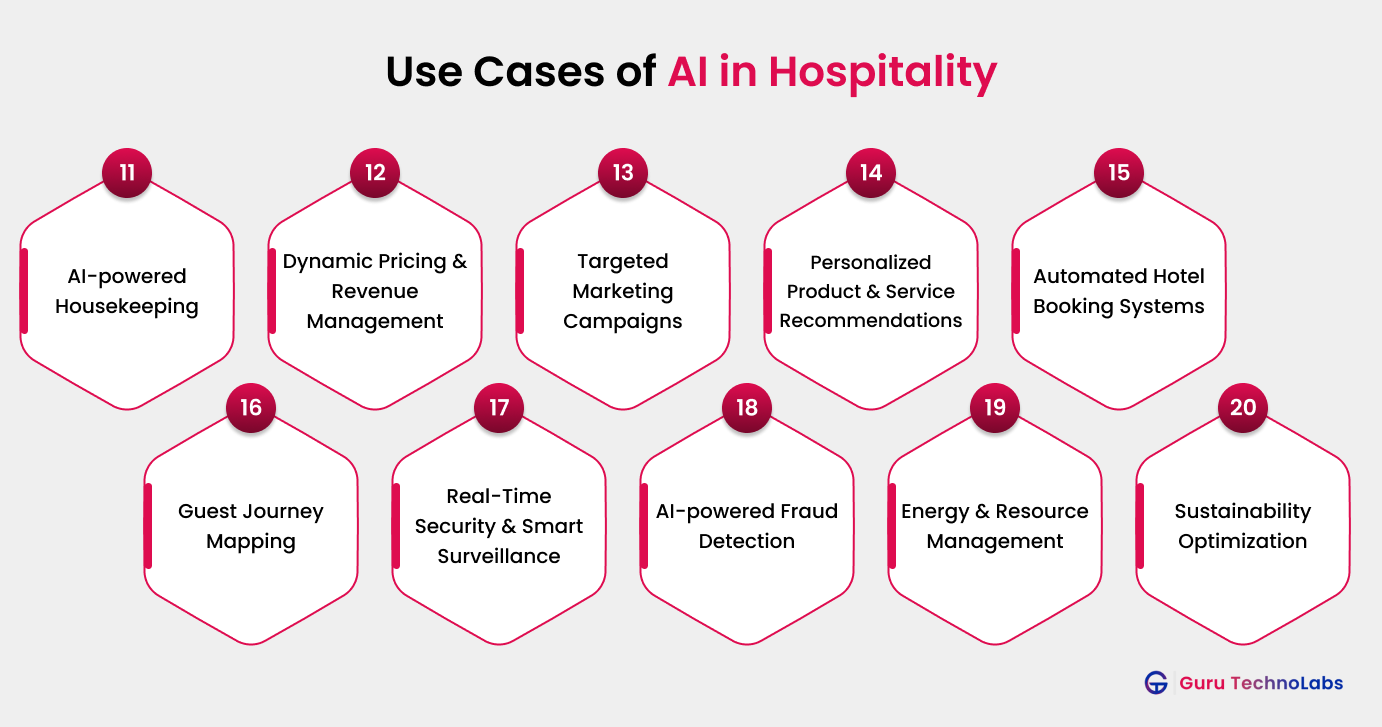
11. AI-powered Housekeeping
Smart sensors notify staff when rooms are vacant and need cleaning, while AI predicts peak housekeeping demands. This improves operational efficiency and ensures quicker room turnover for guests.
12. Dynamic Pricing & Revenue Management
AI revenue systems analyze market trends, local events, and competitor pricing in real time. Hotels can automatically adjust rates to maximize occupancy and revenue without manual intervention.
13. Targeted Marketing Campaigns
By analyzing guest data and behavior, AI enables hyper-personalized promotions. Hotels can run campaigns tailored to specific traveler segments, increasing engagement and bookings.
14. Personalized Product & Service Recommendations
Whether it’s offering spa treatments to wellness travelers or late check-outs for business guests, AI ensures hotels present the right offers at the right time, boosting upsell opportunities.
15. Automated Hotel Booking Systems
AI-driven booking engines simplify reservations by offering personalized options, predicting guest preferences, and removing friction in the checkout process.
16. Guest Journey Mapping
AI analyzes touchpoints across the guest journey, from discovery to post-stay feedback helping hotels identify gaps and refine the overall experience.
17. Real-Time Security & Smart Surveillance
AI-enabled surveillance detects suspicious activity, crowding, or emergencies in real time. This strengthens guest safety while reducing the burden on security personnel.
18. AI-powered Fraud Detection
Payment fraud, identity theft, and booking scams can be flagged instantly by AI systems analyzing unusual transaction patterns, ensuring secure operations.
19. Energy & Resource Management
Smart energy systems adjust power and water usage based on occupancy and usage patterns. Hotels save costs while minimizing unnecessary consumption.
20. Sustainability Optimization
AI monitors waste, energy efficiency, and supply chain practices, helping hotels achieve their sustainability goals while appealing to eco-conscious travelers.
Ethical Considerations When Imlementing AI in Hospitality
As hotels adopt AI solutions, addressing ethical concerns is critical for building guest trust, ensuring compliance, and driving sustainable digital transformation.
Privacy and Data Security
Protecting guest data is paramount, as AI systems often process sensitive personal information. Hotels must implement robust encryption and clear consent protocols to safeguard privacy.
Bias and Fairness
AI algorithms should be regularly audited to prevent unintentional bias in guest interactions and services. Striving for fairness ensures all guests receive equitable treatment regardless of background.
Transparency and Accountability
Hotels must be transparent about how AI is used in guest-facing services and decision-making. Clear accountability structures help maintain trust and allow for effective oversight.
Human Oversight and Control
While AI can automate many tasks, human oversight is essential to address complex or sensitive situations. Staff should always be available to intervene when needed.
Sustainability and Responsible Use
AI should be leveraged to support sustainable practice, not just operational efficiency. Responsible use of technology contributes to broader environmental and social goals.
Real-World Examples of AI in the Hospitality Industry
Here are some real-world use cases of artificial intelligence and machine learning in the hospitality industry.
Marriott’s ChatBotlr
Marriott’s Aloft brand introduced ChatBotlr, a text-based AI chatbot that handles guest requests and provides information instantly. By offering round-the-clock support, the tool improves convenience and reduces the workload on hotel staff.
Renaissance Hotels’ RENAI
Renaissance Hotels launched RENAI, an AI-driven concierge service that combines machine learning with local expertise. Guests can get curated recommendations for dining, entertainment, and experiences directly through text or WhatsApp, creating more personalized stays.
InterContinental Hotels Group (IHG) Concierge AI
IHG’s Concierge AI enhances guest communication by managing reservations, handling queries, and delivering real-time responses. This ensures guests enjoy prompt, tailored service without long wait times.
Hilton’s AI Chatbot
Hiltonbot is a multilingual AI-powered assistant that has already handled millions of conversations. From booking assistance to answering common queries, it helps reduce customer service wait times by up to 30% while maintaining consistent service quality.
Booking.com’s Chatbot
Booking.com leverages AI to streamline traveler interactions. Its chatbot supports booking modifications, answers questions, and guides users through the reservation process—improving engagement while saving valuable time for both customers and staff.
Hyatt’s AI Chatbott
Hyatt employs AI-powered chat to assist guests with bookings, room service, and general inquiries. This solution ensures quick, accurate responses and delivers a smoother, more satisfying guest experience.
Future Trends and Opportunities of AI in Hospitality
AI has made a significant shift in the hospitality industry, transforming everything from chatbots and virtual assistants to robotic automation and smart energy management. These advancements in travel technology are reshaping how hotels operate, enhancing efficiency, and delivering more personalized experiences than ever before.
If you are connected to the hospitality sector and looking to leverage AI to elevate your business, expert guidance is important. For tailored consultancy and support in implementing cutting-edge AI strategies, contact us for AI Development Services. We are here to help you unlock new opportunities and future-proof your hospitality business.
Frequently Asked Questions
No, AI will never replace human intervention in the hospitality sector. However, it can augment and improve guest experience and also eliminate errors caused by human staff.
Implementation can be slow, starting with specific areas such as chatbots for customer services or implementing smart room devices. But it requires proper training, effective communication, and minimizes disruption.
When it comes to how AI is leveraged in hotels, the emerging technology can help brands create more personalized experiences, schedule staff, and change pricing based on availability and demand.
Guru TechnoLabs specializes in developing robust and scalable AI solutions for the hospitality sector. Our experience covers a range of applications, including AI-based chatbots, robotics, and much more, to improve guest experience and operational efficiency.


